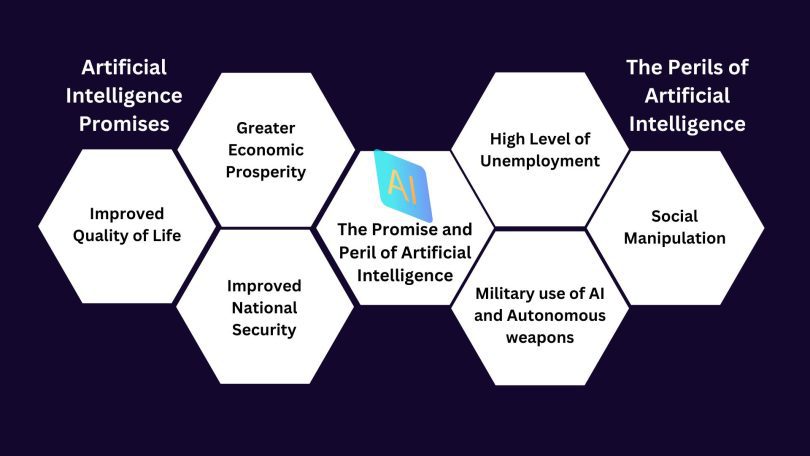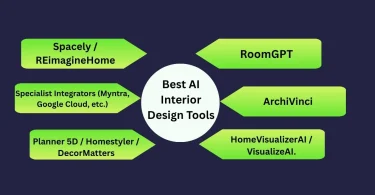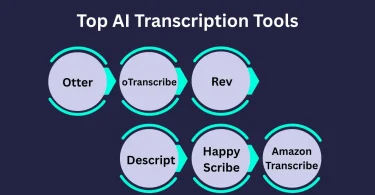It is believed that AI will lead to greater levels of economic growth, increased welfare and even increased measures of national security with its progress. However, with these opportunities, there come major threats such as militarization, threat of job losses arising from automation, social manipulation, and biases in the AI systems. As this article is going to reveal the topic is a dual look at AI, which would enable the reader to understand the role that it may harness for the various sectors in manufacturing, finance, transportation, agriculture, education and even healthcare as well as the concerns that must be met to address the ethical issues of AI advancement.
Artificial Intelligence Promises
AI significantly enhances all aspects of society, yielding several key benefits:
Greater Economic Prosperity
The predicted levels of economic development are based on the opportunities of AI as a part of the Fourth Industrial Revolution. These advancements are anticipated to revolutionize several industries across manufacturing, financial markets, transport, trade and others.
AI in Manufacturing: The two key areas of interest are Artificial Intelligence (AI is expected to propel manufacturing that is more efficient and reliable as well as adaptable and effective) and Supply Chain Management (SCM is significant in maneuvering the supply chain in order to meet the intended production objectives). Additionally, robots are going to perform some of the work activities that are deemed dangerous for human employees to execute.
AI in Finance: These systems will increase the stability of financial markets as they will identify problematic financial patterns and prevent their manifestations in the early phase.
Transportation: The Use of AI technologies that will apply to the transportation system will make them efficient and consume less energy making traveling more reliable by having fewer chances of accidents than others that are not AI-supported.
Agriculture: In the agriculture sector, we will see a positive surge in the usage of AI to ensure sustainable farming practices, and get better specifics on crops, for planning planting, watering, use of fertilizers, and other techniques of harvesting.
AI in Commerce: The use of AI in communication and science and technology will result in discoveries of new devices and software that will enhance economic performance.
Improved Quality of Life
The developments in the sphere of AI will be accompanied by improvements in and availability of education as well as living conditions.
AI in Education: It was possible to have smart learning systems that could provide personalized teaching and learning at a pace that is suited to the student.
AI in Healthcare: AI technologies may change the healthcare system by developing targeted drug delivery systems based on the patient’s genetic makeup and more sophisticated robotic systems that perform complex operations.
AI in Personal Services: One of the postulated trends is the widespread of AI-based personal services, which are already presented by such helpers as Siri, Alexa, and Cortana. These technologies will also enhance access for the most vulnerable groups such as children, the aged, minorities and the disabled.
Improved National Security
AI helps to enhance national security through the process of automation.
AI-based sensor systems could prevent the loss of buildings and infrastructure by predicting and preventing disruptions or disasters (natural or man-made).
In the same way that manufacturing has been enhanced by AI technologies, the same enhanced technologies could be used to plan for the distribution of emergency relief items.
AI can be used in surveillance, as it can help identify patterns that can be used to predict and thus prevent the crowd from becoming violent.
The Perils of Artificial Intelligence
On the one hand, the potential of AI is enormous, and on the other hand, history and literature tell us about the threats that may appear if AI becomes self-sufficient.
Military use of AI and Autonomous weapons
The positive impact of AI in improving security is, however, associated with the threat of weaponization and atomization of weapons. As opposed to current systems in which human operators monitor and control the operation of autonomous weapon systems in real-time, the latter could independently identify and attack targets.
High Level of Unemployment
Another important issue is the threat of mass unemployment as a result of AI-based automation, particularly if there are no ongoing attempts to educate people about new jobs as a result of such innovations.
It is quite challenging to determine which industries will be most impacted, and even industry specialists have varying views. For example, while there are opinions that automated trucking will lead to massive job cuts, professionals in the industry assess that the effects will be relatively small in the next 5-10 years, with the creation of new positions, and increasing efficiency.
Social Manipulation
The increasing dependence on AI has caused a lot of controversy regarding the manipulation of society. Bots, however, possess distinct advantages: they can post at a much higher frequency and also be more accurate in the kind of messages they post to their target audience.
Discrimination and Bias
Although decisions made are generally thought to be neutral, this is not always the case. The algorithms behind such systems are designed by human beings who can unconsciously bring their prejudice into the program. In addition, the parameters that regulate the analysis and design of AI are set by people who are themselves biased. The datasets that are used in training the AI systems may themselves be biased, which makes the AI systems deliver results that seem prejudiced. Even though machines are not prejudiced themselves, there is a possibility of prejudice or discrimination in the results because of human interference and this is scary.
The threats of AI are multifaceted. However, there are many AI researchers from government, industry and academia working on these problems. Perhaps with more coordination, these experts may be in a position to define the building that will help society to appreciate the gains in artificial intelligence as well as the costs that are involved.




Leave a Comment